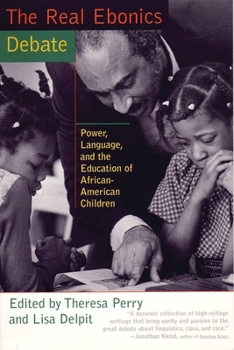The Real Ebonics Debate: Power, Language, and the Education of African-American Children
Select Format
Select Condition 
Book Overview
In the winter of 1996, the Oakland school board's resolution recognizing Ebonics as a valid linguistic system generated a brief firestorm of hostile criticism and misinformation, then faded from public consciousness. But in the classrooms of America, the question of how to engage the distinctive language of many African-American children remains urgent. In The Real Ebonics Debate some of our most important educators, linguists, and writers, as well as teachers and students reporting from the field, examine the lessons of the Ebonics controversy and unravel the complex issues at the heart of how America educates its children. "A dynamic collection of high-voltage writings that bring sanity and passion to the great debate about linguistics, class, and race." -Jonathan Kozol, author of Amazing Grace "Anyone in the field of education-teacher, administrator, researcher, policy maker-who is seriously concerned with issues of race, class, and the politics of language in America's schools should read this book. It presents the most comprehensive and thoughtful discussion of Ebonics in education that I have yet encountered." -Frederick Erickson, University of Pennsylvania "This is the best pragmatic and theoretical treatment of the recent Ebonics controversy. Great clarity and common sense come from an excellent selection of scholar-practitioners." -Asa Hilliard, Georgia State University "At last there is a book that talks sense about the Ebonics debate and makes a powerful case for honoring the many languages we speak. A must read." -Herbert Kohl, Georgia State University "The comprehensive source for teachers who want to be successful teachers of African-American children." -Gloria Ladsen-Billings, author of The Dreamkeepers Theresa Perry is associate professor and vice president for community relations at Wheelock College in Boston. Lisa Delpit is the Benjamin E. Mays Professor of Urban Educational Leadership at Georgia State University in Atlant
Format:Paperback
Language:English
ISBN:0807031453
ISBN13:9780807031452
Release Date:June 1998
Publisher:Beacon Press
Length:242 Pages
Weight:0.82 lbs.
Dimensions:0.7" x 6.0" x 9.0"
Customer Reviews
3 ratings
A multifaceted analysis of the Ebonics question
Published by Thriftbooks.com User , 22 years ago
I am writing this review for two reasons. The first is to praise this book for approaching the question of Ebonics and education from so many different perspectives. The second is to refute the racist diatribe in one of the previous reviews in which the reviewer criticizes Ebonics as being substandard. As a Ph.D. in linguistics, I can assure you that Ebonics is as rich and creative as any other language on earth. It is a language with a structure and a history going back centuries. The reviewer who criticized Ebonics does not understand how human language functions. It is not a question for debate. Ebonics is a language that is not inherently better or worse than any other human language. To allow speakers of Ebonics to discover this fact and to take pride in the rich history of their language can only be seen in a positive light, as far as I can tell. This book allows the reader to hear from teachers, linguists, and administrators who are experts in their fields. It should be required reading for everyone, but sadly it alone cannot overcome the prejudices held by some less enlightened members of society, as shown by one of the previous reviews.
Shedding light on an important educational issue.
Published by Thriftbooks.com User , 23 years ago
... As one who has actually read the book, ... I highly recommend it.Contrary to media frenzy and popular belief, the Oakland school board did not pass a resolution in 1996 requiring that Ebonics, or Black English, be taught in place of Standard English. It did, however, pass a resolution recognizing what linguists had known for years: that Ebonics, like Spanish or German, is not defective English but a valid linguistic system following precise rules of grammar. It also recognized that while students speaking Ebonics need to learn Standard English to attain success in mainstream American society, to do so they must be treated with the same respect as any student who enters the classroom speaking a different language or dialect. (English as a Second Language) Instead, they are often dismissed as lazy or stupid.This collection is a common-sense look at the the issue, and a must-read for anyone who loves language.
Telling the Truth About Urban Schools
Published by Thriftbooks.com User , 24 years ago
As an Oakland, California teacher educator, parent, and former teacher, I am convinced that when Oakland is trashed in the media it has usually done something on the side of justice. The "ebonics debate" is just one recent example. This excellent book captures how path-breaking and righteous the Oakland school board was in defending the rights of African-American students to maintain the language they bring to school at the same time they learn the conventions of "Standard English." The interview with teacher Carrie Secret is excellent. If you teach or go to school, buy the book!





